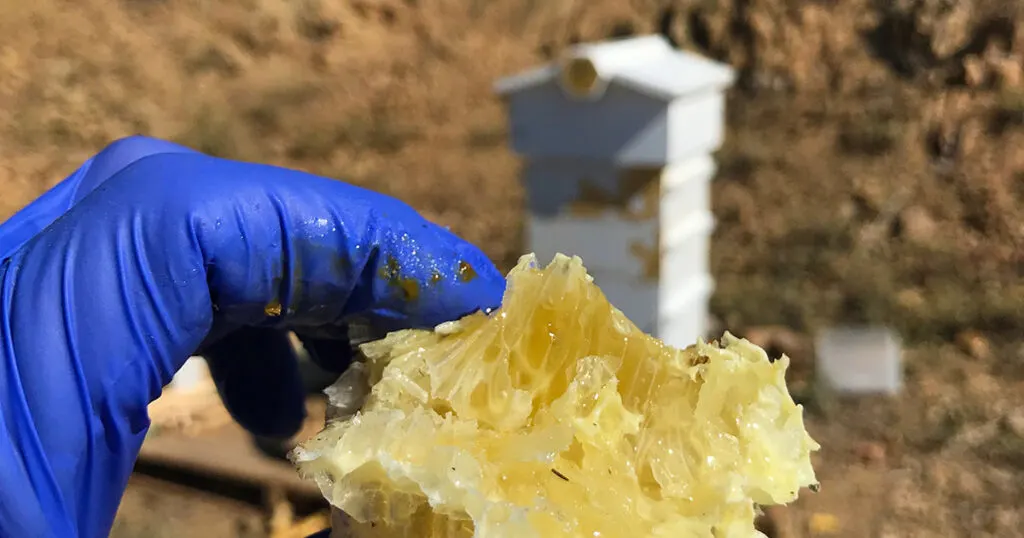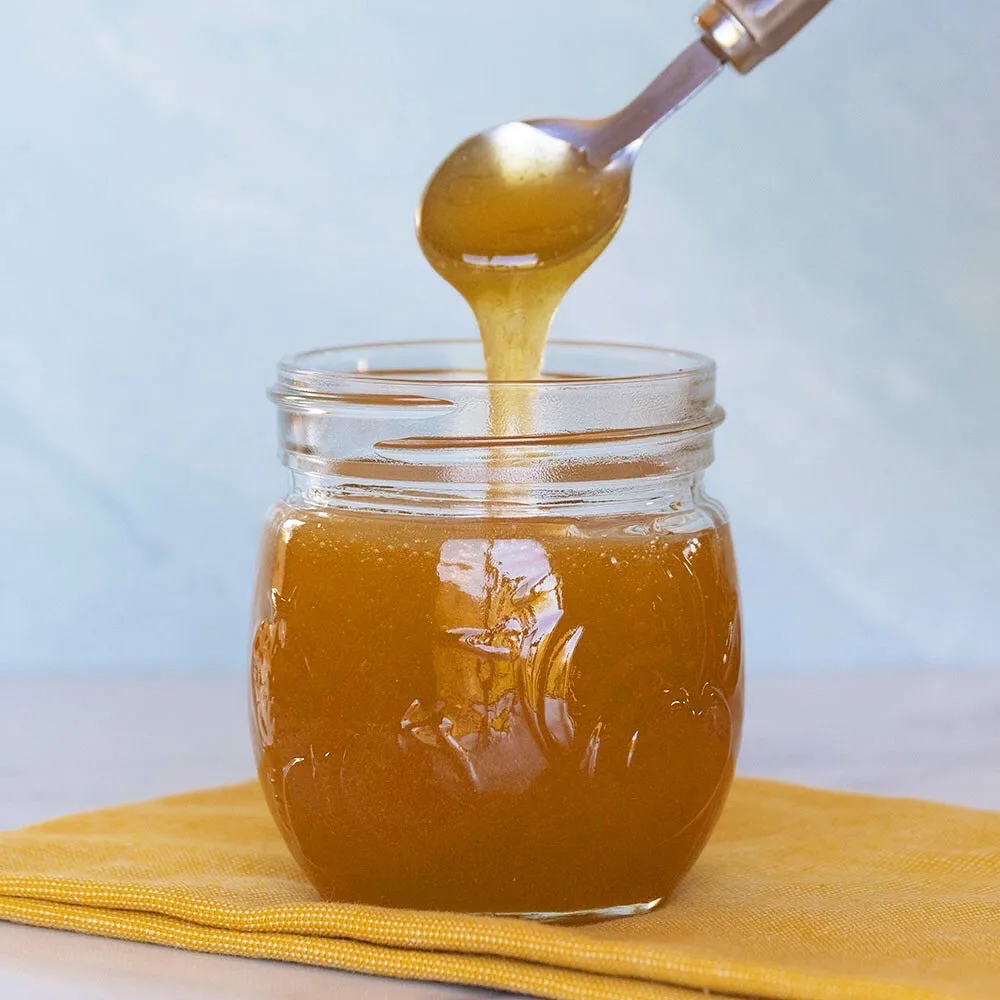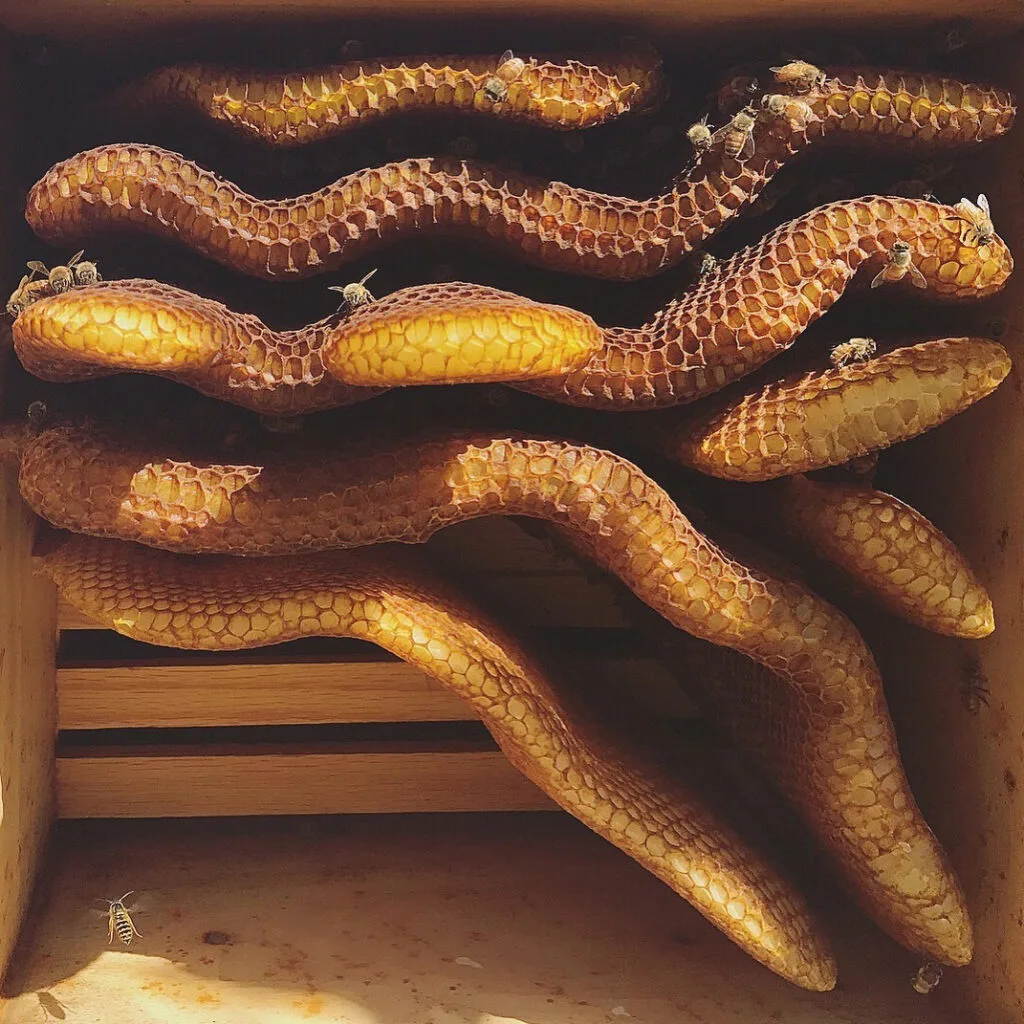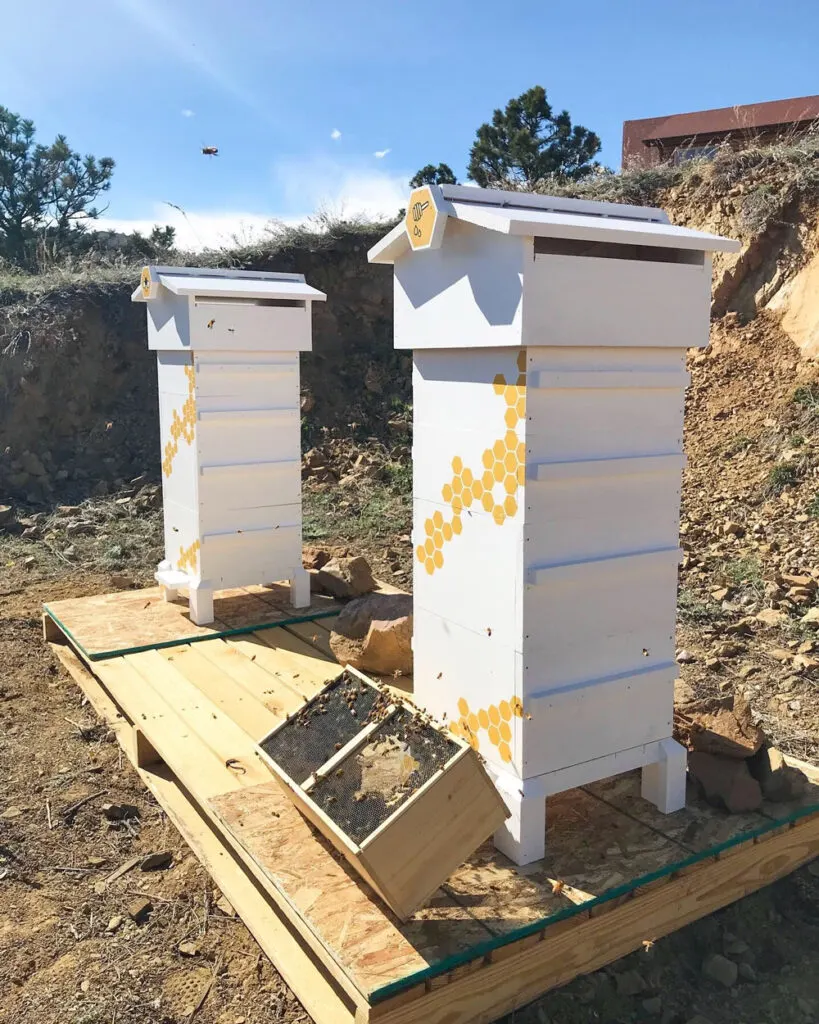Honey should be a primary component in your food storage plan due to its nutritional value, medicinal benefits, and remarkable longevity. While it’s often overlooked for other staples like grains or canned goods, honey’s versatile nature makes it a crucial asset in a survival situation.

Scroll all the way to the bottom to see our recommendation on WHAT TO BUY for storage.
Nutritional and Medicinal Value
Honey is a rich source of essential vitamins, minerals, and antioxidants. Its carbohydrate content provides a quick energy boost when necessary, making it a practical choice during periods of scarcity. Beyond nutrition, honey has well-documented medicinal properties. It can help combat infections due to its antimicrobial characteristics. It’s also a natural cough suppressant and can be used to treat minor burns and wounds.
Honey’s antibacterial properties and its role in wound healing have been recognized since ancient times, and they’re increasingly validated by modern science. Here are some ways honey aids in health and wellness:
1. Fights Infections: Honey’s antimicrobial properties make it effective against a wide range of bacteria and fungi. Its acidity, low moisture content, and a substance called “inhibine” all contribute to these antibacterial qualities. Notably, honey can combat antibiotic-resistant strains, making it a powerful tool in an era of increasing antibiotic resistance.
2. Heals Wounds and Burns: Honey can be applied topically to minor wounds and burns. Its healing effect is attributed to its ability to keep the wound moist, its antibacterial properties, and its antioxidant content that aids in tissue regeneration. Clinical studies have shown that honey dressings can speed up healing in burn victims.
3. Cough Suppressant: Honey can be an effective remedy for a persistent cough. Research suggests that it might even be more effective than some common over-the-counter cough medicines. A spoonful of honey can soothe an irritated throat, reducing the severity and frequency of coughing.
4. Digestive Aid: Honey can also help with a variety of digestive issues. It’s been used to treat diarrhea by rehydrating the body and replenishing lost electrolytes. Its prebiotic components help nourish the good bacteria in our gut, aiding digestion and overall gut health.
5. Skin Care: Honey is often found in natural skin care products due to its moisturizing and antioxidant properties. It can help cleanse pores while hydrating the skin, making it a wonderful addition to your skin care routine.
Honey’s antimicrobial properties help combat infections, including those resistant to antibiotics. It’s a natural solution for coughs, minor burns, and wounds. In addition, honey supports digestive health as a rehydrating agent and prebiotic. It’s also used in skin care for its moisturizing and antioxidant benefits. Given these extensive benefits, honey is a valuable asset for survival scenarios and overall health.
Nutritional and Medicinal Value of Honey

Why Honey is the Preferred Sweetener
In the context of food storage, you need to consider energy content and palatability. Here, sweeteners like sugar play a role. However, unlike refined sugar or corn syrup, honey isn’t just empty calories. It also delivers essential nutrients. Honey’s unparalleled shelf life makes it superior – it doesn’t spoil if stored correctly. Cases of edible honey dating back several millennia serve as a testament to its remarkable longevity.
Storing Honey
Honey’s low moisture content and acidic pH create an inhospitable environment for bacteria, making it virtually everlasting. For storage, simply keep your honey in a cool, dry place, and ensure it’s sealed. Once opened, honey can absorb moisture from the air and ferment, so a tight seal is crucial.
Longevity of Honey
The longevity of honey isn’t a modern discovery. Honey has been prized for its durability and longevity for thousands of years. The oldest honey ever found was discovered in the Georgian mountains, sealed in an ancient tomb, and dated back to about 5,500 years ago – and it was still edible.

The secret to honey’s eternal shelf life lies in a couple of factors. The first is its low moisture content. Honey is hygroscopic, which means it has a low moisture content in its natural state but can easily absorb moisture if left unsealed. This characteristic makes it hard for bacteria and microorganisms to survive and multiply in it, enhancing its longevity.
Secondly, bees, those fantastic little creatures, add an enzyme called glucose oxidase to the nectar as they’re processing it. This enzyme, when in contact with moisture, breaks down into hydrogen peroxide, a well-known disinfectant, which helps preserve the honey and ward off bacterial growth.
Low pH
Lastly, honey has a low pH level. This acidity prevents the growth of many bacteria. The average pH of honey is around 3.9, and many bacteria need a more neutral pH level to multiply.
So, thanks to its chemical composition, its low moisture content, and the work of our buzzy little friends, honey can stay fresh indefinitely, given it’s kept in a sealed container to prevent it from absorbing moisture from the air.
Such natural longevity is rare in a food product and makes honey an invaluable resource for long-term food storage and survival planning. Imagine, honey stored today could potentially still be good for generations to come.
Understanding Our Society’s Vulnerabilities
Recognizing the potential for societal disruption caused by natural disasters, pandemics, economic and turmoil, it’s prudent to have a solid food storage strategy. The stability and nutrition that honey provides make it an essential component of any food storage plan.
Honey’s incredible longevity, dating back thousands of years, is due to its low moisture content and acidity, making it inhospitable for bacteria and microorganisms. Bees add an enzyme that creates a natural disinfectant, further enhancing its preservation. Kept sealed to prevent moisture absorption, honey remains fresh indefinitely, making it an excellent resource for long-term food storage.
Long Term Storage of Honey

Additional Benefits of Honey
Honey is a dense source of energy, providing around 64 calories per tablespoon. This energy is readily accessible, which can be crucial for survival. Honey also acts as a natural preservative, potentially extending the shelf life of other food items. In a disrupted economy, honey could serve as a valuable bartering tool, illustrating its worth beyond just nutritional and medicinal uses.
What Could Go Wrong & Why Should I Store Honey?
The importance of storing honey becomes clear when considering potential disruptions to food production. Here are a few possible scenarios:
- Natural Disasters: Earthquakes, hurricanes, floods, wildfires, or droughts can severely disrupt local and even global food production and distribution systems. When these events occur, having a stockpile of honey provides a durable and nutrient-rich food source.
- Global Pandemics: As the COVID-19 pandemic has shown, global health crises can create significant disruptions in food supply chains. In such situations, having honey stored can be an invaluable resource due to its indefinite shelf life.
- Economic Crises: Financial downturns can lead to an increase in food prices or shortages of certain items. Honey’s long shelf-life and versatility as a food and sweetener make it a sensible item to store.
- Political Instability/War: Political unrest or war can disrupt food production and distribution, making it difficult to access basic food items. Honey, with its long shelf life and health benefits, can provide sustenance during such challenging times.
In all these situations, honey’s durability, nutrition, and versatility would make it an incredibly valuable resource to have on hand.
Honey is an essential food storage item due to potential disruptions like natural disasters, pandemics, economic crises, and political unrest. These scenarios can hinder food production and distribution, making accessible and nutritious food scarce. Honey, with its indefinite shelf life, health benefits, and resilience to these issues, becomes an invaluable resource during these times.
Why Store Honey
How do we store our bulk, food storage honey?
Storing honey in 5-gallon buckets is a practical and efficient method, especially for long-term storage. The buckets provide a sturdy, airtight seal that prevents moisture from getting in and keeps the honey fresh. The larger size is ideal for those who want to keep a substantial amount of honey on hand, whether for daily use, for survival food storage, or for trade in case of an emergency situation. It’s also easier to manage, reducing the need for many smaller containers. Just remember, honey stored this way should be kept in a cool, dry place away from direct sunlight to maintain its quality.
CONCLUSION
In conclusion, honey offers more than just a touch of sweetness. It is a nutrient-dense, medicinal, preservable, and versatile resource. As you organize your food storage plan, the inclusion of honey isn’t merely advantageous—it’s essential.
